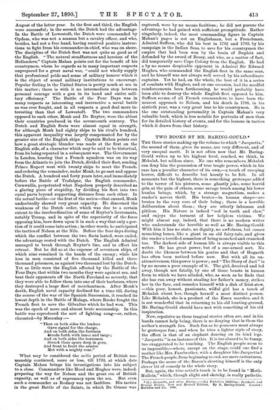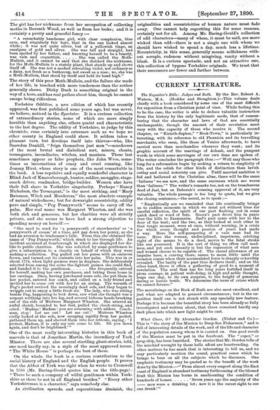TWO BOOKS BY MR. BARING-GOULD.* THE three stories making up
the volume to which "Jacquetta," the second of them, gives its name, are very different, and of very unequal merit. It is not often now that Mr. Baring. Gould writes up to his highest level, reached, we think, in Mehalah, but seldom since. No one who remembers Mehalah can deny him the possession of true tragic power, which in his case has a peculiar character of its own,—a touch of creeping horror, difficult to describe but keenly to be felt. In all moments but the highest, there is something grotesque added to the terror of his pictures, some ghastly joke, some horrid grin at the pain of others, some savage touch among his lower hunian beings, which, by a strange magnetism, makes a reader's nerves thrill. His brutes—in human shape—are brutes to the very core of their being ; there is a horrible deliberation about them ; they are utterly inhuman and pitiless. His Nature is indeed "red in tooth and claw," and enjoys the torment of her helpless victims. We might almost say, indeed, that there is no modern writer who understands the horrible so well as Mr. Baring-Gould. With him it has no state, no dignity, no awfulness, but comes munching bones, like a giant in an old fairy-tale, and gives the reader a terrified sensation of being munched and crunched too. The darkest side of human life is always visible to this writer. He has great power, but of a one-armed sort. No doubt the likeness between his genius and that of Hogarth has often been noticed before now. But with all its un- attractiveness, this power is power; and" The Story of Teel" is by no means a poor example of it. The girl, deceived and led away, though not fatally, by one of those beasts in human form to which we have alluded, who, as soon as he finds that she has run away without stealing her father's money, strikes her in the face, and consoles himself with a dish of Irish stew, —this poor, honest, passionate, wilful girl has a touch of Mehalah about her, though herself a most distinct person. Like Mehalah, she is a product of the Essex marshes, and it is not wonderful that in returning to his old hunting-ground, Mr. Baring-Gould should have met with something of his old inspiration.
Now, repulsive as these tragical stories often are, and in his hands cannot help being, there is no denying that in them the author's strength lies. Such fun as he possesses must always be grotesque fun ; and when he tries a lighter style of story, the effect is that of an elephant dancing on its hind legs.
"Jacquetta "is an instance of this. It is too absurd to be funny, too exaggerated to be touching. The English people seem to us impossible,—where, except on the stage, could one find a mother like Mrs. Farebrother, with a daughter like Jacquetta P The French people, from beginning to end, are mere caricatures. Perhaps the scene of the Baron's shooting himself is the only clever bit of comedy in the whole story.
But, again, the true artist's touch is to be found in "Moth- Mullein," which, though slight and sketchy, is really pathetic.
• (L) Jacquefta, and other Stories.—(2.) Yorkshire Oddities: Incidents and Strange Events. New and Revisal Edition. By S. Baring-Gould. London : Methuen and Co. 1880.
The girl has her nickname from her occupation of collecting moths in Darenth Wood, as well as from her looks ; and it is certainly a pretty and graceful fancy :—
" A remarkably handsome girl, with clear complexion, blue eyes, and singularly fair hair, that in the sun looked almost white ; it was not quite silver, but of a yellowish tinge, an amalgam of gold and silver. She was tall and straight, had been spoiled by her father, and knowing herself to be a beauty, was vain and coquettish. . . . . . She was called the Moth- Mullein, and it cannot be said that she disliked the nickname, for the Moth-Mullein is a stately plant, that stands up and shows itself off. She was not a modest retreating violet, not ordinary as a daisy, not fresh as a buttercup, not sweet as a rose; no, she was a Moth-Mullein, that stood by itself and held its head high."
The story of this poor Moth-Mullein, and the failure she made of her life, is touched with more tenderness than the author generally shows. Dicky Duck is something original in the way of a hero, and has real pathos about him, though he cannot escape being ridiculous.
Yorkshire Oddities, a new edition of which has recently appeared, was first published some years ago, but was never, we believe, noticed in the Spectator. It is a curious collection of extraordinary stories, some of which are more simply horrible than anything else, others quaint and characteristic to the last degree. The oddity of Yorkshire, to judge by this chronicle, runs certainly into extremes such as we hope no
other county in England could show. It seldom takes a pleasant turn, but develops itself into thieves—who, like Snowden Dunhill, "feign themselves just men "—murderers of the most brutal and diabolical sort, misers, cheats, termagants, incendiaries, witches, and maniacs. These last sometimes appear as false prophets, like John Wroe, some- times as incarnations of crazy and cruel cunning, like Jemmy Hirst, whose story is one of the most remarkable in the book. A less repulsive and equally wonderful character is • Blind Jack of Knaresborough, hunter, soldier, smuggler, stage- coach driver, roadmaker, bridge-builder. Women also have their full share in Yorkshire singularity. Perhaps "Nancy Nicholson, the Termagant," is the most striking, and "Mary Bateman, Witch and Murderess," the most absolute example of natural wickedness ; but for downright eccentricity, oddity pure and simple, "Peg Pennyworth" seems to carry off the palm. Her real name was Margaret Wharton, and she was both rich and generous, but her charities were all strictly private, and she seems to have had a strong objection to spending money on herself :—
"She used to send for a pennyworth of strawberries' or a pennyworth of cream' at a time, and pay down her penny, as she had an aversion to tradesmen's bills. From this she obtained the name of 'Peg Pennyworth,' which stuck to her through life. An incident occurred at Scarborough in which she displayed her dis- like to public charities. She was solicited by some gentlemen to give a subscription. to a charity on behalf of which they were making a collection. Peg pulled out her purse with an ominous frown, and turned out its contents into her palm. This was in or about 1774, when light guineas were in disgrace. She deliberately selected from among the coins the lightest guinea she could find,
and handed it to the gentlemen She frequently catered for herself, making her own purchases, and taking them home in her carriage. Once, having purchased some eels, she put them in her pocket, entered her coach, and called on a lady friend and invited her to come out with her for an airing. The warmth of Peg's pocket revived the seemingly dead eels, and they began to wriggle out to enjoy a little fresh air. The lady, who was sitting beside Peg, happening to look down, saw what she thought was a serpent writhing into her lap, end several hideous heads breaking out of the side of Mistress Margaret Wharton. She uttered an awful shriek, bounded to her feet, pulled the cheek-string, and cried : Madam ! Madam ! you are swarming with adders. Coach- man, stop ! Let me out ! Let me out !' Mistress Wharton coolly looked at the eels, now escaping rapidly from her pocket, gathered them up, and shoved them into her reticule, saying : I protest, Madam, it is only my eels come to life. Sit you down again, and don't be frightened."
One of the most really interesting histories in this book of marvels is that of Jonathan Martin, the incendiary of York Minster. There are also several startling ghost-stories, told, one need hardly say, in a style of the most approved terror. "The White House" is perhaps the best of these.
On the whole, the book is a curious contribution to the social history of England and the English people. It proves that the Abbot of York was right when he wrote to Cromwell in 1556 (Mr. Baring-Gould quotes him on the title-page) : "There be such a company of wilful gentlemen within York- shire as there be not in all England besides." "Every other Yorkshireman is a character," says somebody else.
As civilisation spreads, and superstitions diminish, the originalities and eccentricities of human nature must fade away. One cannot help regretting this for some reasons, certainly not for all. Among Mr. Baring-Gonld's collection of odd characters—many of whom, it must be said, are more wicked than odd—there is not a single one with whom we should have wished to spend a day, much less a lifetime. Eccentricity, in this sense, generally means selfishness with- out scruple, rudeness without misgiving, vanity without a blush. It is a curious spectacle, and not an attractive one, this collection of bygone Yorkshire originals. We trust that their successors are fewer and farther between.



































 Previous page
Previous page